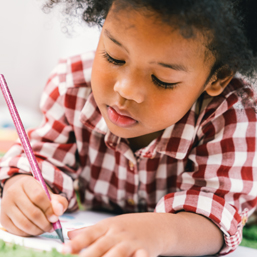
This past school year has tested us all. You may feel concerned that your child may be falling behind. But what does ‘falling behind’ mean? Across Alberta, we have all experienced this educational roller coaster. ‘Normal’ education, as we remember it, hasn’t been a reality for anyone this year. This means, we are all in this together. We are all supporting our children in skill-building, assessing what they know, and thinking about gaps that need to be filled.
Ways to support continued skill development
You might be wondering how to assess where your child is at academically. It can feel daunting knowing your child might not have all the skills they need to be successful come the new school year. However, learning doesn’t have to happen at a desk or on Zoom. Learning can happen in a variety of ways.
Learning happens all day, whether you (or your kids) realize it or not. You can make everyday activities into a learning opportunity. Household chores can build skills in math, science, and teamwork. Reading books can help with learning history, art, improve literacy and reading comprehension. Nature walks can build skills in biology, math, and promote mental well-being. Movies and documentaries can target all subjects.
When thinking about building a learning activity, think about these questions:
Taking on the role of a teacher can be stressful and lead to burnout. Parent burnout makes it harder for you to feel engaged with your child, feel rested, and feel emotionally available. Academic success is not a sprint, and it won’t do you or your child any good if you burn out. Keep mixing in fun learning opportunities when you have time to do so. And if you don’t have it in you that day, don’t worry! Taking care of yourself will make future attempts more positive and productive. Make it a daily goal to connect with your child in a fun way through play, books, or movies. These positive moments will help make learning opportunities in the future more fun for everyone!
The hierarchy of learning
Academic success can only happen if your child’s basic needs are met. This includes being well-rested, being socially connected, being fed nutritious food, being emotionally supported, being well-regulated. Heading into the new school year, it will be important to think about having routines that keep your family healthy and happy. Starting the day with a good breakfast, enjoying family dinners together, keeping a consistent bedtime routine, and having fun outdoor playtime are all necessary in meeting your child’s pre-learning needs.
Social connection is a basic need that needs to be met before a child can learn. You may have concerns about your child’s social connections this past school year. Although restrictions have impacted social opportunities, children are adaptive and resilient! Your child will be able to pick back up where they left off with their friends and continue to expand and develop their social skills when they are back with their friends at school in September.
Planning for the upcoming school year
When assessing potential academic gaps, your child’s teacher will be a key support in identifying any of your child’s needs. Teachers are professionals who are trained to assess and create appropriate accommodations based on your child’s unique needs. They are aware of the skills your child will need to be successful in their grade level. This past year has shown that teachers are creative, resilient, and flexible, so utilize their knowledge and resources.
You are your child’s best advocate. If you feel that your child is behind, build relationships with your teacher, learning specialists, and the administration at your school. These professionals will be able to direct you to resources that would be a good fit for your family and create a plan with you to support your child.
Most importantly, the human brain is built to learn. Children’s brains are like sponges, soaking up new information and skills. When children are exposed to new academic concepts, they will quickly build on the skills they already have. It will be important for you to have positive conversations with your child about learning. Focus on what they will learn, not what they haven’t. Don’t focus on language that talks about ‘falling behind.’ Negative conversations about learning may impact a child’s confidence going into the new school year. Remember, this pandemic has challenged us all. School looked different, progress might look different, but we can all work together to monitor any gaps and help children continue to develop academically.
Ashlee and Lisa are child psychologists who created KidsConnect Psychology as a place for children and families to access tools, supports, and therapy. Check out the website, kidsconnectpsychology.com, for digital downloads, parenting tool kits, information about parent counselling, school consultations, daycare consultations, and more! Follow on Facebook and Instagram.
Calgary’s Child Magazine © 2024 Calgary’s Child